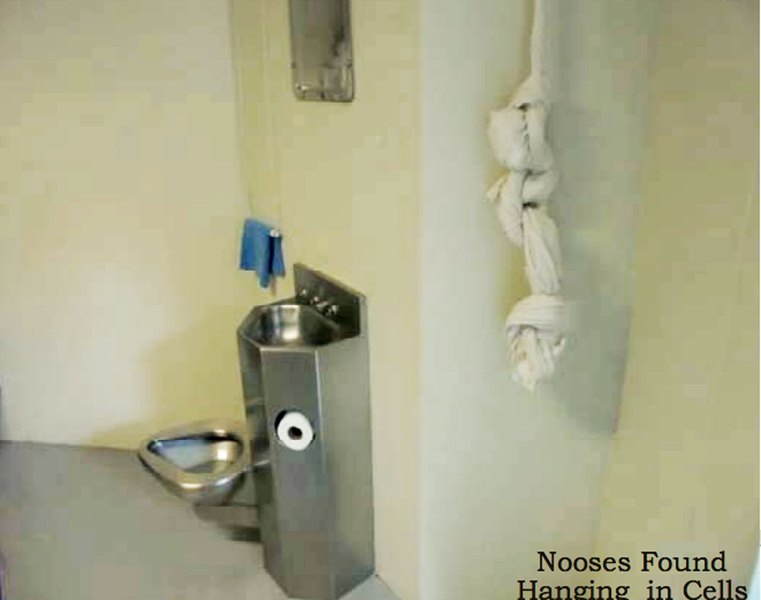
California immigration center: nooses among problems found.
A Nicaraguan man who was detained at the Adelanto ICE Processing Center died in March 2017 after he was found hanging in his cell from his bedsheets. Not long after, two other detainees also used sheets in an attempt to hang themselves.
When federal officials arrived in May of this year for a surprise inspection of the privately run immigration detention facility, they found nooses made from bedsheets in 15 of 20 cells.
“When we asked two contract guards who oversaw the housing units why they did not remove the bedsheets, they echoed it was not a high priority,” officials with the Department of Homeland Security inspector general’s office wrote in a scathing report made public Tuesday detailing dangerous conditions found at the facility during their unannounced visit.
The nooses are just one of many problems posing “significant health and safety risks” identified by federal inspectors at Adelanto, which can house nearly 2,000 detainees as they await the outcome of their immigration cases.
Detainees reported waiting “weeks and months” to see a doctor, and inspectors met with a dentist who dismissed the necessity of fillings, and suggested that detainees use string from their socks to floss, the report said.
Inspectors also said they found that detainees were commonly subjected to disciplinary segregation before being found guilty of violating rules.
The report is the latest from government inspectors to document significant deficiencies at Adelanto since it opened in 2011.
It comes one year after immigrant advocates raised alarms about conditions at the facility following the deaths of three detainees in a three-month period in 2017.
The Times reported in August 2017 that there had been at least five attempted suicides at the facility in less than one year, according to a review of 911 calls.
Lori Haley, a spokeswoman for Immigration and Customs Enforcement, said in a statement that immigration officials take the findings seriously and have “agreed to conduct a full and immediate review of the center to ensure compliance with detention standards and expedite necessary corrective actions.”
Tens of thousands of ICE detainees have passed through the Adelanto facility since it opened seven years ago. It is owned and operated by the GEO Group, which runs dozens of private prisons and detention centers around the country.
Among those held in the facility are asylum seekers, people caught in immigration sweeps and those identified by authorities as potentially deportable after landing in jail.
Some detainees arrive at the facility soon after crossing the border; others after having lived in the U.S. for decades. They can stay in detention for months, and in some cases years, as their cases are decided.
Pablo Paez, a spokesman for GEO Group, referred questions about the inspector general’s report to ICE.
According to the report, in the months after Osmar Epifanio Gonzalez-Gadba, 32, of Nicaragua was found hanging from bedsheets in his cell and later died, ICE compliance reports documented at least three suicide attempts by hanging at Adelanto, two of which specifically used bedsheets.
Still, when inspectors visited the facility, they found braided sheets that both staff and detainees referred to as nooses hanging from the vents in 15 of the approximately 20 male detainee cells that they visited in four housing units.
The guard who escorted the inspectors began removing the nooses but stopped after realizing how many there were, the report says. Some detainees said they use the unfurled sheets for privacy, while others said they used them as clotheslines.
One detainee, however, told inspectors that he had seen “a few attempted suicides using the braided sheets by the vents.”
“The guards laugh at them and call them ‘suicide failures’ once they are back from medical,” the detainee told officials.
Inspectors also found during their visit that all 14 detainees who were in disciplinary segregation at the time were put there before being found guilty of a prohibited act or rule violation.
And though ICE standards require face-to-face medical assessments of all detainees in segregation at least once a day, inspectors observed two doctors in the unit stamping their name on detainee records outside their cells “without having any contact with 10 of the 14 detainees in disciplinary segregation.”
The report also notes that some detainees reported waiting “weeks and months” to see a doctor and said that appointments were canceled without explanation, with detainees placed back on the waiting list.
From November 2017 to April 2018, detainees filed 80 medical grievances with the facility for not receiving urgent care, not being seen for months for persistent health conditions and not receiving prescribed medication, according to the report.
Inspectors also highlighted serious problems with dental care at the facility, saying detainees are placed on wait lists for months and, sometimes, years to receive basic care, “resulting in tooth loss and unnecessary extractions in some cases.”
No detainees have received fillings in the last four years, according to the report. One detainee reported multiple teeth falling out while waiting more than two years for cavities to be filled.













